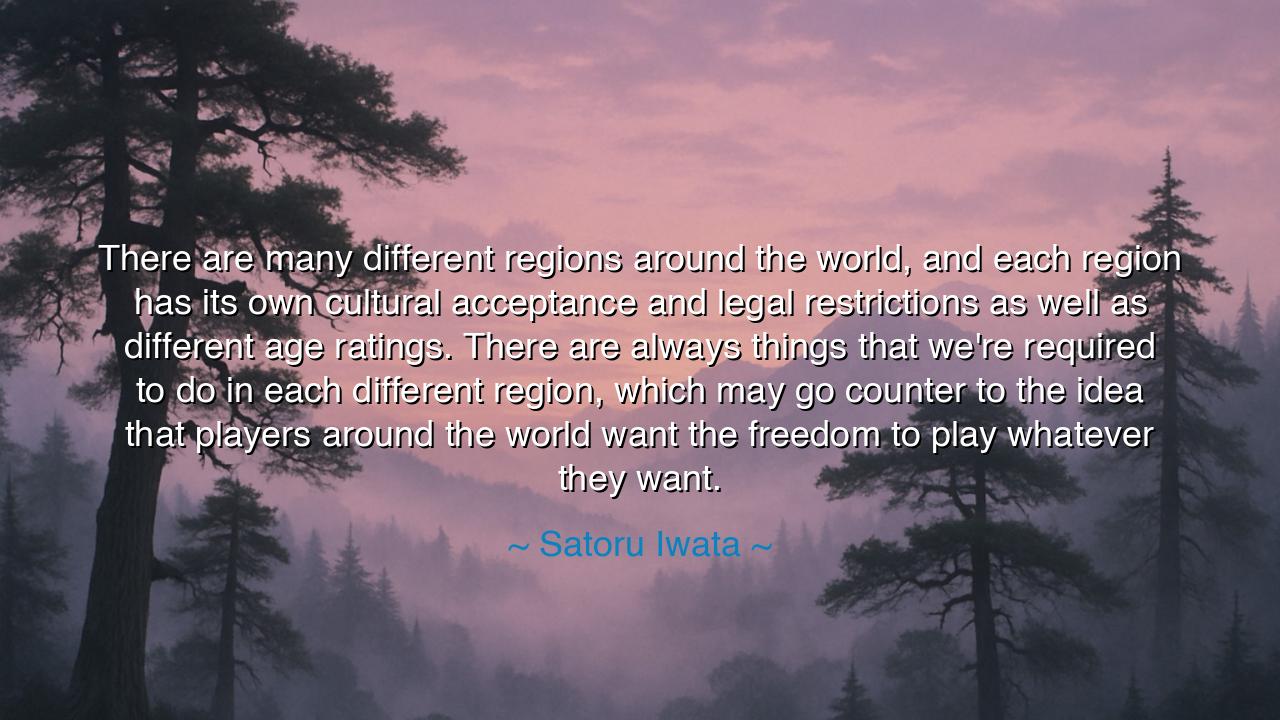
There are many different regions around the world, and each
There are many different regions around the world, and each region has its own cultural acceptance and legal restrictions as well as different age ratings. There are always things that we're required to do in each different region, which may go counter to the idea that players around the world want the freedom to play whatever they want.






“There are many different regions around the world, and each region has its own cultural acceptance and legal restrictions as well as different age ratings. There are always things that we’re required to do in each different region, which may go counter to the idea that players around the world want the freedom to play whatever they want.” Thus spoke Satoru Iwata, the gentle visionary and master craftsman of the digital age, who guided Nintendo through an era of transformation. His words, humble yet profound, reveal a truth as old as civilization itself—that the freedom of creation must always walk in balance with the responsibility of understanding. For in this statement lies the eternal tension between the universal and the particular, between the boundless imagination of the artist and the boundaries drawn by society’s values, laws, and customs.
Iwata, though a man of technology, spoke like a philosopher of harmony. As the President of Nintendo, he oversaw a company whose games reached every corner of the earth, crossing borders and generations alike. Yet he understood what many forget—that culture is not a single language. What one society celebrates, another forbids; what one finds amusing, another may find offensive. In his wisdom, he did not lament these differences but respected them, for he saw that diversity is not an obstacle to art—it is its very soil. Still, he acknowledged the pain of limitation, the frustration of creators who must tailor their dreams to the varied laws and moral frameworks of many lands. The creator seeks universality, but the world demands discretion, and thus art must find a way to live between the two.
In the ancient world, this tension was not unknown. The philosopher Plato, in his ideal republic, called for strict control over art and stories, believing that what people see and hear shapes their souls. Yet Aristotle, his pupil, argued that art’s purpose was to express and reflect the human condition, to free the spirit through catharsis. Between these two—control and freedom—humanity has always walked a narrow path. Iwata’s quote, spoken in the context of global entertainment, revives this ancient debate in modern form: How does one create something universal when every nation, every culture, sets its own boundaries of what is “acceptable”? His answer is one of balance—to honor local laws and sensitivities without losing the heart of the experience that unites players everywhere.
Consider the story of Nintendo’s journey across nations. In Japan, their games carried a certain style—whimsical, restrained, deeply rooted in cultural modesty. But as they spread to the West, adjustments were needed: symbols changed, dialogues softened, references altered to fit foreign sensibilities. Some fans cried that this was censorship, the loss of artistic purity. Yet Iwata saw deeper. He knew that to connect the world, one must translate, not erase. It was not enough for a game to exist; it had to belong—to fit within the laws, the values, and the hearts of those who played it. To ignore these realities would be to risk chaos and misunderstanding. Thus, the true art of global creation, he taught, lies not in stubborn defiance but in the grace of adaptation.
There is an even greater wisdom within his words, one that transcends gaming. For what he describes is the condition of all human endeavor. In every field—art, politics, religion, or philosophy—there exists the dream of universality, and yet the world remains divided by context and custom. To impose one culture’s ideals upon another without care is to breed resentment; to honor difference without losing connection is to achieve harmony. Iwata’s insight reminds us that freedom cannot exist without understanding, and that true creativity requires empathy. The wise creator is not the one who insists that his work remain untouched, but the one who learns to shape it so that it can live and breathe in many worlds.
The pain of limitation is real, and yet it need not be a prison. Iwata believed that boundaries could inspire innovation. When artists, engineers, or thinkers face constraints—be they cultural or legal—they are forced to discover new ways to communicate, new forms of beauty that transcend language or law. The simplicity, purity, and joy that became the hallmark of Nintendo’s creations were not born from total freedom, but from the discipline of working within boundaries. In this, Iwata’s teaching aligns with the wisdom of the ancients: that form gives life to art, and that true mastery is shown not in doing whatever one pleases, but in achieving greatness within the possible.
The lesson, then, is clear and timeless: freedom and responsibility must coexist. To create for the world, one must first understand the world. To speak to many hearts, one must listen to their rhythms. Respect does not silence expression—it refines it, giving it the power to reach farther, endure longer, and unite deeper. Let not the artist despise limitation, nor the audience demand perfection. Let both remember that creation is a dialogue, not a decree.
So remember, children of the digital and the real, the wisdom of Satoru Iwata: that in a world of many cultures and countless boundaries, the truest form of freedom lies not in ignoring the walls, but in building bridges across them. Create boldly, but with humility. Honor difference, but seek unity. For when the art of one becomes the joy of all, when understanding and imagination walk hand in hand, then the world itself becomes the greatest game—one that all may play, and in which everyone may win.






AAdministratorAdministrator
Welcome, honored guests. Please leave a comment, we will respond soon